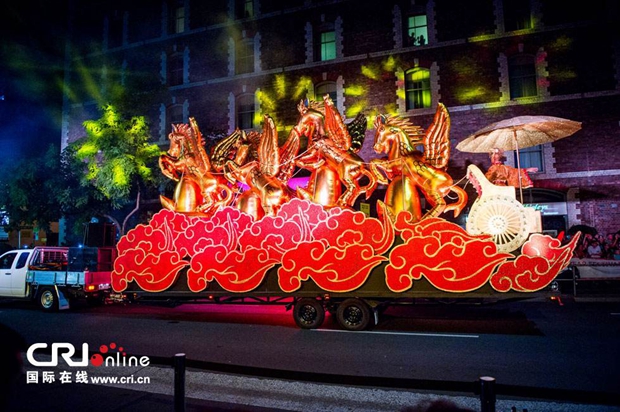Happy New Year and Spring Festival to my Chinese friends
- By Eugene Clark
 0 Comment(s)
0 Comment(s) Print
Print E-mail China.org.cn, February 16, 2018
E-mail China.org.cn, February 16, 2018

Spring Festival celebrations in Australia [Photo/CRI]
As a child growing up in Wichita, Kansas and living in the same city as my grandmother's large family of 16 children, I was surrounded by relatives, music, dancing, singing, laughter – many happy memories that have served as a strength throughout my life. At their best, families can inspire us to reach higher goals and become the best possible version of ourselves. In times of trouble families can offer support to help us to pick ourselves up and "get back in the race."
Thinking about families also reminds me that one of my favorite times in China and one that speaks so strongly about Chinese tradition and importance of family is the Chinese New Year or Spring Festival which occurs over 15 days. This festival is not only important in China, but is also celebrated by Chinese diaspora everywhere. To give one a sense of the size of the festival, it is said that the Spring Festival is the largest human migration in the world.
Similar to the Christmas season in the U.S., the Spring Festival takes place in three phases. The preparation period is the time for "spring cleaning” as the house is made ready for visitors, items are purchased for decorations and gifts are arranged for the celebration. This is also a time to buy new clothes, especially for children.
The Festival having arrived, it is time to celebrate. That begins with great food. In the South with its rice tradition that means "Niangao" (glutinous rice cake); while in the drier, cooler North one sees a greater emphasis on dumplings. Food, drink, singing, dancing, special TV programs highlighting festivities all around China, family reunion dinners, all night conversations, exchange of cards and gifts, fireworks and more are all part of the scene.
In China and among my Australian Chinese friends in Sydney, traditional red envelops are exchanged at this time of year. These money envelops are traditionally given to family members and relatives. Employers will also present red cards to employees.
Similar to the Christmas card tradition in the West, cards and best wishes for the new year are also sent to friends, teachers and significant others. One also sees posters of the "Fu" in images and words – meaning good luck and happiness – posted on doors and at gates. For example, I enjoyed such a poster on my apartment door on the campus of China University of Political Science and Law.
Culture and tradition, however, do not mean that things are static and unchanging. It is interesting to see that 21st century awareness of pollution has resulted in less fireworks in spring festival celebrations today. Also, the red card and “Fu” have taken on modern forms through use of WeChat to post electronic versions of red envelopes and electronic New Year's greetings.
With the Spring Festival also comes the peak period for match-making and weddings. This makes perfect sense given the presence of family members and relatives. One can again see similarities in the West with "Spring" being associated with love, romance and courtship.
Similar to the Irish tradition of extending "blessings" to family and friends at this time of year, there are many Chinese "sayings" that convey similar sentiments. Some of the ones I have encountered in English, include:
?"This New Year, may prosperity and peace never abandon your home and hearth."
?"May the New Year be as cheerful as the cherry blossoms in the flowering trees."
?"This Holiday season may you successfully scare away bad luck and be blessed with good luck."
?"May the New Year bless you with goodness to abandon all vices and embrace all that are virtuous."
?"This Lunar New Year may your life hold for you as much variety as the various phases of the moon."
?"This New Year realize the fact that Lady Luck blesses only those who are cheerful and optimistic."
With the close of the Spring Festival, I hope we will all be reminded of philosopher George Santayana's observation that: "the family is one of nature's masterpieces." China's Spring Festival is indeed a wonderful example of family traditions and the power of "connection." It is a time to remind us of the simpler, essential things of life and the blessings that come when we work and play together and focus on those many things that we have in common and which unite people around the world – members of our human family. As British playwright George Bernard Shaw once wrote: "A happy family is but an earlier heaven."
Eugene Clark is a columnist with China.org.cn. For more information please visit:
http://www.ccgp-fushun.com/opinion/eugeneclark.htm
Opinion articles reflect the views of their authors only, not necessarily those of China.org.cn.





